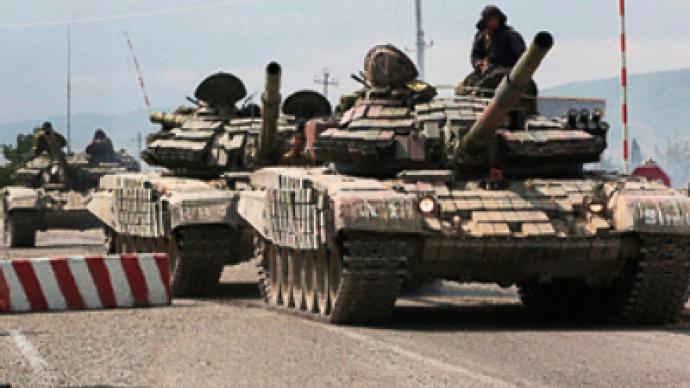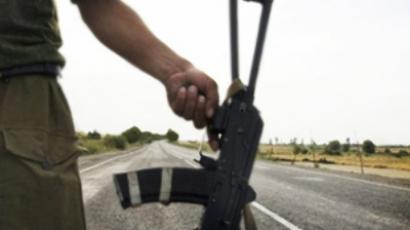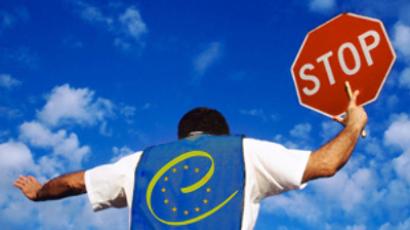Der Spiegel: Georgia not a victim of “Russian aggression”

The reputable German news magazine has sparked uproar in its latest issue by proclaiming that Georgian President Mikhail Saakashvili started the war by attacking South Ossetia on August 7, 2008.
Der Spiegel, citing “confidential documents,” opens its article inside the downtown office of Heidi Tagliavini, the Swiss diplomat in charge of the European Union’s Independent International Fact-Finding Mission on the Conflict in Georgia (IIFFMCG).
“From her office on Avenue de la Paix… Heidi Tagliavini, 58, looks out onto the botanical gardens in peaceful Geneva,” begins the sensational story ("A Shattered Dream in Georgia"). “The view offers a welcome respite from the stacks of documents on her desk, which deal exclusively with war and war blame.”
There is just one problem: Tagliavini’s office strongly denies that any sort of interview took place between the German publication and the EU finding-mission.
In an email exchange with RT, the office of Heidi Tagliavini wrote: “Der Spiegel, in today’s edition (25/2009) published a two page article… which reflects on the work of IIFFMCG in a largely speculative and unsubstantiated way. In this context, I would like to state the following:
“Spiegel’s article is not based on information provided by… Ambassador Tagliavini, or any other authorized sources…. There has been no interview, background briefing or any other way of communication in order to provide information for the article.”
The letter goes on to confirm that “the report… shall be presented to the EU Council of Ministers by 31 July 2009 and comes under the sole and exclusive responsibility of Ambassador Heidi Tagliavini, and not under the responsibility of the Mission’s experts or the majority of its experts.”
Is there a mouse in the EU house?
Der Spiegel stands by its claims that it has obtained the unpublished documents, and judging by the following passage may have had a peek at Tagliavini’s cluttered desktop.
“The facts assembled on Tagliavini’s desk refute Saakashvili’s claim that his country became the innocent victim of ‘Russian aggression’ that day.”
From the very first gunshot in last year’s five-day war, CNN, BBC, Fox News and all of the other western news affiliates were trying to outdo each other in their groundless claims that Russia was responsible for launching a full-scale invasion on Georgia.
Although the reports did absolutely nothing to clarify the situation, they did betray the level of shocking uniformity that exists across the board in the world of western media (It should be noted that RT was the only English-language news channel that accurately reported the events during those five long days of bloodshed, thus proving the need for balance and sober commentary in the world of international media).
With the western media machine practically camped out inside of his Tbilisi office, Saakashvili was able to convince the world that Georgia was an innocent victim of Russia’s “imperialistic instincts.” It took many months before the western news agencies admitted that they were wrong in their hasty assumptions.
The first thaw in the ice of public deception came with French President Nicolas Sarkozy’s trip to the embittered region.
“Let’s put things clearly, there was a Georgian military aggression,” Sarkozy told RT in an interview. “That was a mistake.”
Later, senior monitors from the Organization for Security and Cooperation in Europe (OSCE), who were on the ground in South Ossetia during the war, verified that Georgia had fired the first shot was the truth revealed.
“It was clear to me that the (Georgian) attack was completely indiscriminate and disproportionate to any, if indeed there had been any, provocation,” said Ryan Grist, a former British army captain.
Finally, video footage provided by RT, which documented Georgian war atrocities, was played before a UN Security Council meeting.
Here are some of the incriminating bits of information that the German publication alleges to have uncovered from various members of the fact-finding commission.
“Georgia’s dream is shattered,” commission member Christopher Langton, a retired British Army colonel, is quoted in the article as saying. “But the country can only blame itself for that.”
Another commission member, Bruno Coppieter, a political scientist from Brussels, asks whether Georgia, which has strong NATO aspirations, may have had outside help in its misadventure.
“The support of Saakashvili by the West, especially military support,” Coppieter writes, “inadvertently promoted Georgia’s collision course.”
Finally, Otto Luchterhandt, a Hamburg international law expert, argues that “because the Georgians attacked a base used by Russian peacekeeping forces in the South Ossetian provincial capital Tskhinvali, Russia can invoke the right of self-defense under Article 51 of the United nations Charter,” Der Spiegel writes, paraphrasing Luchterhandt’s comments.
Tiny countries can be aggressors too…
But perhaps the most damaging claim in the article, which obliterates Saakashvili’s claims of “Russian aggression,” argues that large numbers of Russian tanks were nowhere near the border of South Ossetia on August 7.
“The experts found no evidence to support claims by the Georgian present, which he also mentioned in an interview with SPIEGEL, that a Russian column of 150 tanks had advanced into South Ossetia on the evening of Aug. 7,” the article alleges. “According to the commission’s findings, the Russian army didn’t enter South Ossetia until August 8.”
The author of the article, Uwe Klussman, writes that “Saakashvili had already amassed 12,000 troops and 75 tanks on the border with South Ossetia on the morning of Aug. 7.”
The commission members were allegedly impressed by past comments from the Georgian president demonstrating he was long considering a military solution to the South Ossetian problem.
“If you ask any Georgian soldier why he is serving in the armed forces, each of them will respond: ‘To reestablish Georgia’s territorial integrity,’ Saakashvili said in a television address on May 25, 2004.”
Indeed, if the fact-finding commission concludes that Georgia was responsible for sparking the conflict, which resulted in the death of some 1,000 civilians and soldiers, this could mean that Georgia’s hopes for gaining membership into NATO will be put on the back burner for a long time, possibly indefinitely. There is also the uncomfortable question of American complicity, which provided extensive military aid, in addition to 150 military trainers, to the Caucasian belligerent.
Finally, it will give the Georgian opposition parties, already smelling blood, new ammunition in its struggle for power.
Eka Beselia, the leader of the Movement for United Georgia, holds Russia responsible for its “aggression” during the war, but also believes Saakashvili is guilty of getting Georgia in to the war in the first place.
“On one hand, we certainly condemn… Russia’s aggression against Georgia,” Beselia told RT. “But at the same time President Saakashvili as the head of state is politically responsible for failing to avoid this provocation. He drew the country into this prevocational war. He is to blame for it as well.”
Not all roses for Russia
But some of the other revelations in the article do not have Russia coming out smelling like roses, either.
“The commission members generally agree… that the Georgians and Russians alike violated the provision in the Geneva Convention for the Protection of Civilian persons in Time of War. Both armies, for example, used cluster bombs, which distribute explosives over a wide area, killing several civilians and wounding many more,” Der Spiegel writes. “Georgia admits to having used the weapons, while Russia denies the charges.”
Finally, the article said that Tagliavini’s team “won’t be questioning the Americans,” according to an unnamed commission member. The reason provided is that “our director and the EU apparently lack the courage” to take that step.
Tagliavini’s office heatedly rejected those allegations in its email to RT:
“Contrary to the allegations referred to in the article, there is not and never has been any reluctance or unwillingness on behalf of IIFFMCG to interview senior U.S. diplomats such as former Assistant Secretary for Europe Daniel Fried on America’s role in the conflict.”
It is difficult to say what long-term effects this article could play in the ongoing investigation. The fact that Der Spiegel somehow became privy to this classified information could actually play to Georgia’s favor.
One Russian foreign policy expert, who served as a high-ranking officer in the Russian Army for 30 years, suggested that the Der Spiegel article “sabotaged,” possibly intentionally, the ongoing investigation, as well as Russia’s efforts for a fair hearing.
“Russia… won the ground war, but lost the propaganda war,” the expert said, who spoke on condition of anonymity. “Thus, it was vital that this investigation prove irrefutably that Russia was attacked and forced to defend itself and the citizens of South Ossetia. At this point, we need truth, not more unfounded fabrications.”














